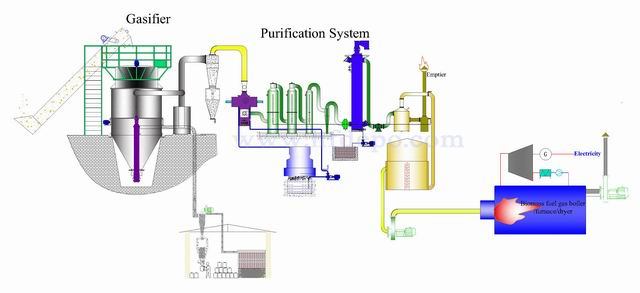DEDE pushes for “Power generating station”

The Department of Alternative Energy Development and Efficiency (DEDE) has built a prototype of integrated community biomass power plant to develop up to 1 MW biomass power plant on a community scale and promote the “Power generating station” to drive alternative energy.
The Department of Alternative Energy Development and Efficiency (DEDE) has studied ways to promote integrated community biomass power plant as a prototype for up to 1 MW biomass power plant on a community level for other area. It has developed a biomass power production process that is easy to operate and maintain while educating community members responsible for system maintenance. It has also set up a biomass coordination center to closely follow up on development in biomass-fired power plant in each area and make sure that they do not create material adverse effect that might eventually lead to objection in the future.
However, absence of up-to-date data for biomass management planning is one key obstacle for the promotion of biomass-fired power generation. As data changes all the time while private operators lack confidence in government data, they do not operate in accordance with the government’s guideline. Besides, biomass price hike could also lead to higher investment cost of biomass-fired power plant, making it uncompetitive against fossil fuel.
Moreover, biomass scarcity is also an issue due to a greater number of biomass power plants and more industrial plants shifting to use biomass fuel. Meanwhile, biomass supply has not increased due to limited agricultural area and unpredictable behavior of farmers, who tend to shift to plant crops with high price. Any natural disaster that affects agricultural area could also lead to higher fuel price and eventually fuel scarcity.
Furthermore, resistance from local community against biomass power plant project is also another key obstacle. This problem is caused by inadequate communication between project developer and local residents to convey accurate understanding about the biomass power plant project. Besides, capacities of some sizable biomass power plant projects do not match biomass potential and available resources in the area and they tend to generate larger environmental impact than smaller projects. Therefore, they usually face with strong resistance by local residents.
Biomass power production technology is rather complicate and requires sophisticated observation and problem solving skills. Meanwhile, persons responsible for the biomass power production in the community level usually lack knowledge and understanding about the system procedure and maintenance, leading to system damage. This gives the impression that biomass power production is too complicate while lacking of staffs and organizations directly responsible for the development and follow up on biomass power plants is also another key concern.
Other problems are laws and regulations such as the connection to the national grid, unattractive power purchase price, limited domestic producers of power generation equipment, grid restriction in area with biomass potential. The biomass power generation promotion under the 10-year Alternative Energy Development Plan aims to promote power plants in the community level that needs to create investment partnership as it involves substantial investment cost and long break even period.
In order to achieve the 10-year Alternative Energy Development Plan, the DEDE encourages community to take parts in alternative energy generation and usage by promoting the establishment of “Community power generating station”. It has enhanced incentives for the private sector, improved infrastructure systems such as power transmission system and national grid to support biomass projects development, educated the public about biomass, promoted research studies to develop integrated alternative energy such as biomass power generating technology development and biomass fuel processing technology.
Moreover, the DEDE will also collect and update agricultural output data to create biomass database to plan zoning, study obstacles in promoting biomass fuel for power generation, study untapped biomass fuel such as compressed sugarcane leaf, improve biomass steam pot efficiency to suit power production and usage, and develop simple biomass technology that is convenience to implement with size variety to fit with different area. Should the government be able to achieve its target, Thailand will have more integrated biomass power plants and reduce the future need to build huge power plants.
| Attachment | Size |
|---|---|
| 194.72 KB |


